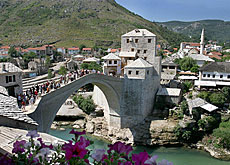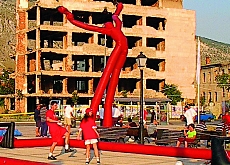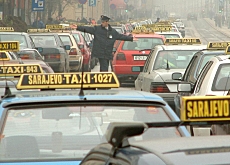Cooperation with Bosnia is Swiss priority

Switzerland has been a major supporter of war-ravaged Bosnia-Herzegovina's long-term reconstruction, investing heavily in the country since 1996.
To mark ten years’ cooperation work, the Swiss Agency for Development and Cooperation (SDC) has been organising a series of events, including forums with experts from Bosnia and Switzerland.
“We are providing a platform for discussion to share experiences, rather than ready-made solutions,” Ruedi Schoch, head of the SDC’s coordination office in Sarajevo, told swissinfo.
In recent years, Swiss cooperation has focused on long-term structural support, business development and state reform. A total of SFr486 million ($397 million) has been invested over the past decade.
The anniversary talks centred on issues such as the right to be heard, local autonomy, the integration of minorities and the border regions.
“Strengthening the central authorities whilst taking into account the concerns of each different entity is one of the main aims of ongoing constitutional reforms,” explained Schoch.
The involvement of civil society is also a key theme, especially concerning reforms and community reconstruction projects.
In autumn last year, the European Union started negotiations with Bosnia regarding the Stabilisation and Association Process – the EU’s policy framework for the Western Balkan countries. But a number of reforms are required before the end of the process.
The country needs to improve its cooperation with the International Criminal Tribunal for the former Yugoslavia, renew its constitution and implement planned reforms of the police.
“The police reforms mean a centralisation of powers using objective criteria to create districts that extend beyond [the usual] political boundaries,” said Schoch. “People have trouble understanding this move away from [traditional] cultural divisions.”
Switzerland has initiated a pilot project that supports the development of community police forces.
“We have met with local communities to discuss police work and possible improvements,” he added.
Doctors
One major Swiss cooperation success story is the SDC’s family doctor programme and Geneva University Hospital’s “Partnerships in Health” foundation.
There is a shortage of family doctors in Bosnia-Herzegovina and medical care is inadequate. At the same time there are plenty of specialist doctors working in the country who charge high fees.
Since 1998, Switzerland has helped to train around 570 doctors and nurses who now work as family doctors.
The programme has led to marked improvements in the medical care provided to poorer sections of Bosnian society.
The Bosnian economy is also looking more robust – it grew by five per cent in 2005. But at the same time, the gap between the haves and have-nots has widened.
“After the compulsory deductions are made, a Bosnian worker earns next to nothing,” explains Schoch.
Extremely expensive insurance premiums also mean that businesses have to pay high salaries.
According to Schoch, this means that Bosnia-Herzegovina is clearly at a disadvantage when compared with its neighbours, such as Croatia.
Unemployment
Around 4,000 jobs have been created in recent years thanks to Swiss support.
The SDC is now focusing on investment promotion and helping small and medium-sized companies develop.
“Most new jobs are in farming, growing vegetables and fruit, and in the timber and furniture industries,” said Schoch.
However, with the unemployment rate in Bosnia still stuck somewhere between 20 and 40 per cent, depending on the method of calculation, and over 50 per cent among those under 28 out of job, show that the economy still has some way to go.
swissinfo, Andreas Keiser
Up until 1992 Bosnia-Herzegovina was a republic belonging to the Socialist Federal Republic of Yugoslavia.
The signing of the Dayton peace agreement in 1995 marked the end of the four-year war, in which around 200,000 died.
The country was subsequently divided into two entities – the Federation of Bosnia and Herzegovina and the Republika Srpska – and the Brčko district.
Under the existing constitution, the central state authorities only have limited responsibilities.
Reforms to the constitution should simplify the complicated and expensive state structures.
Experts regard these as necessary changes if further reforms are to be made and for the growing rapprochement with the European Union.
Switzerland’s cooperation programme in Bosnia-Herzegovina has been running since 1991.
Switzerland has provided around SFr365 million in emergency aid and reconstruction assistance.
Since the end of the 1990s Swiss support has focused on the long-term rebuilding of Bosnia’s democratic institutions and its market economy.

In compliance with the JTI standards
More: SWI swissinfo.ch certified by the Journalism Trust Initiative



You can find an overview of ongoing debates with our journalists here. Please join us!
If you want to start a conversation about a topic raised in this article or want to report factual errors, email us at english@swissinfo.ch.